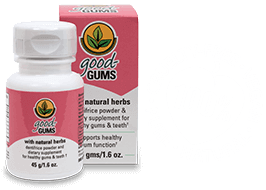Lacking This Nutrient Could Be Causing Your Gum Disease!

In the 1930s, a Canadian dentist named Weston A. Price was involved in one of the hottest topics among dentists at that time: trying to discover why oral health was declining so rapidly among the population.
The deterioration of his patients’ oral health and his growing suspicions that it had something to do with their diets, set him on a revolutionary adventure around the world, where he visited thriving primitive cultures who had very healthy gums and teeth. His intention was to study their diets so that he could learn from their nutritional wisdom.
Out of all the populations he visited (from farmers in Swiss mountain villages, to traditional Eskimos in Alaska, to Aborigines in Australia, to Amazonian, Indian, and Africa tribesmen, to Native American tribes in the Pacific Northwest) he found that they all had the same thing in common. That even though they consumed a wide variety of different diets, all their diets had the same traits – they had no processed foods, no sugars, and no refined starches. They ate only what they could catch or grow themselves.
Price found that all the foods they ate were rich in the fat-soluble vitamins A and D, which are the two main building blocks for strong bones and teeth.
But his real discovery was in the mysterious ‘new vitamin-like activator’, which he named ‘Activator X’. His death in 1948 meant that he never found out what this mysterious nutrient was.

Activator X was, decades later, discovered by scientists to be vitamin K2. Vitamin K2 has since gone down in history as one of the most misunderstood and underappreciated nutrients of all time! Vitamin K2 works in synergy with vitamins A and D to make vitamin A and vitamin D dependent proteins come to life!
While vitamins D and A tell your cells to produce proteins, vitamin K2 activates these proteins which, in turn, carries calcium and other essential minerals out of the soft tissues and into the bones and teeth. These proteins are only functional once they have been activated by vitamin K2, and gives calcium the ‘intelligence’ to know where to go. Without vitamin K2, your body cannot direct calcium to where it’s needed.
Once activated, these proteins work to repair and reverse the damage caused by gum disease.
As soon as the first signs of gum disease appear (inflamed or bleeding gums), our first priority is to calm the immune system. Vitamin K2 has an anti-inflammatory effect on the immune system and has been shown to decrease inflammation in the body by reducing the production of inflammatory markers and regulating immune cells that cause inflammation.
Our ability to stop gum disease in its tracks is dependant on the release of K2 activated proteins to repair the damage.
Vitamin K2 dependent proteins
As gum disease begins to develop, gum tissue will release a bone-building protein called osteocalcin, which is absolutely crucial if the body is to heal gum disease. While vitamin D is required to synthesize osteocalcin, vitamin K2 is required to activate it.
If you are deficient in vitamin K2, then osteocalcin will still be released but not active, so is unable to sufficiently carry calcium to our teeth and bone.
Another vitamin K dependent protein, known as Matrix-GLA, acts as the glue that binds calcium in the body. Matrix-GLA is essential for bone remineralization and dentin formation.
Vitamin K2 deficiency, therefore, limits our body’s ability to remineralize tooth enamel, which, in turn, increases our susceptibility to tooth decay.
If you are showing any signs of gum disease or tooth deterioration, it is recommended that you eat a diet rich in vitamin K2 or consider a supplement.

So how do we get enough vitamin K2 in our diets?
It’s actually quite difficult to get sufficient amounts of vitamin K2 into our diets because it’s contained in foods that most people are less aware of. The amount of vitamin K2 present in foods is usually dependant on how they’re prepared or treated.
For example, animal products containing K2 must come from animals that are grass-fed because vitamin K2 develops when greens containing vitamin K1 are fermented with healthy bacteria. Fermentation usually takes place when pastured animals consume and rapidly digest growing greens such as grass (rather than dead hay), which is why pastured meats and dairy are so rich in vitamin K2.
A dozen eggs a day from caged hens will not provide enough vitamin K2 for your daily requirement, whereas two eggs from chickens that have been pasture raised, provide your daily recommendation of vitamin K2!
Vitamin K2 can also be found in some fermented foods such as sauerkraut, kimchi, and natto (fermented soybeans). However, not all fermented foods contain K2, it all depends on the specific strains of bacteria present during the fermentation process.

Foods loaded with vitamin K2:
- Natto (fermented soybeans)
- Cheese from grass-fed animals
- Egg yolk from pasture-raised hens
- Butter from grass-fed animals
- Fermented foods such as sauerkraut
- Cured pastured meats such as salami
- Organ meats such as liver (from grass-fed animals)
- Meats from grass-fed animals
- Fermented kale
Vitamin K2 works best when teamed with fat-soluble vitamins A and D. The three of them together form a sacred trilogy to give us a strong skeletal system, which they do by regulating calcium into the bone. Check out our article, ‘The Fantastic Four and where to find them’ to make sure you’re eating enough vitamin A and vitamin D rich foods.
We also recommend keeping your gut flora healthy, which will help your gut more efficiently produce vitamin K2. A healthy gut microbiome and the consumption of grass-fed meat or dairy and fermented veggies will provide you with a pretty good dose of K2!
Check out our article ‘How to Make Kefir‘, which gives you instructions on how to make your very own dairy kefir, which is an excellent source of probiotics! Just remember to use grass-fed milk!
Teeth and gums need K2!
Vitamin K2 is absolutely crucial when it comes to preventing tooth decay and healing gum disease. Fat-soluble vitamins are key factors for strong, naturally healthy teeth. Without enough vitamin K2 and it’s accompanying teammates vitamins A and D, your body cannot manage calcium efficiently and therefore your teeth become susceptible to decay and lose their ability to both defend against bacteria and repair and remineralize themselves from the inside.
Be good to your teeth and gums and your whole body benefits!

Subscribe To Our Newsletter
Be the first to receive all our news, offers and natural oral health tips and articles.


